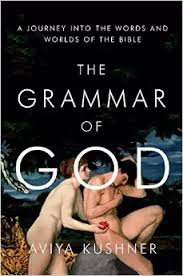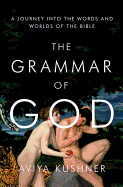 Though The Grammar of God's ostensible subject is its author's initial encounter with the Hebrew Bible in translation--after a lifetime of reading that sacred text in its original language--readers don't have to be Jewish to appreciate Columbia College Chicago professor Aviya Kushner's first book. Instead, the willingness to engage with Kushner's "call for a conversation about how we read, and how we of the twenty-first century live with and live out those readings from centuries ago" is greatly rewarded.
Though The Grammar of God's ostensible subject is its author's initial encounter with the Hebrew Bible in translation--after a lifetime of reading that sacred text in its original language--readers don't have to be Jewish to appreciate Columbia College Chicago professor Aviya Kushner's first book. Instead, the willingness to engage with Kushner's "call for a conversation about how we read, and how we of the twenty-first century live with and live out those readings from centuries ago" is greatly rewarded.
Kushner's book had an unusual genesis, coming to life during the years she studied nonfiction writing with Marilynne Robinson at the Iowa Writers' Workshop. In Robinson's two-semester course on the Bible, Kushner encountered that work in English for the first time, an engagement that, with her teacher's encouragement, eventually grew into this book.
Focusing on a handful of well-known biblical tales, most of them drawn from Genesis and Exodus, Kushner thoroughly explores how "grammar affects key aspects of the Bible." In describing the creation narrative, the confrontation between Adam and Eve and God in the Garden of Eden, elderly Sarah's laughter at learning she will give birth to a child or the giving of the Ten Commandments ("sayings" or "statements" in Hebrew), Kushner, who's not a biblical scholar, discloses that even the most skilled translator time and again must make a judgment call. Those choices, even at their most elegant--as in the King James Bible, a work Kushner admits "both stunned and moved" her--foreclose some of the richness of interpretation that's available in the original.
Kushner gracefully weaves snippets of memoir into her account. Her upbringing as an Orthodox Jew (a relatively liberal one in the ultra-Orthodox enclave of Monsey, N.Y.) made her so uneasy about being seen with a copy of the Oxford Annotated Bible, the first English translation she owned, that she carried it around in a brown paper bag. She also shares the story of her agonizing year as an invalid, when she severely fractured her foot a few weeks after making the decision to leave a secure corporate job to write full time.
Citing the travails of declared heretics like William Tyndale and John Wycliffe, Kushner points out that the translation of this holy book often has been fraught with danger. While she doesn't face that kind of jeopardy, she's produced an enlightening, sometimes daring, work that will help its readers approach an ancient book with fresh eyes. --Harvey Freedenberg, attorney and freelance reviewer
Shelf Talker: In this thoughtful book, Aviya Kushner explores how biblical translations shape our views of the ancient text's meaning.
 "Why do we even bother going to bookstores?...
"Why do we even bother going to bookstores?...










 Acorn Books
Acorn Books


 Married Sex: A Love Story
Married Sex: A Love Story Though The Grammar of God's ostensible subject is its author's initial encounter with the Hebrew Bible in translation--after a lifetime of reading that sacred text in its original language--readers don't have to be Jewish to appreciate Columbia College Chicago professor Aviya Kushner's first book. Instead, the willingness to engage with Kushner's "call for a conversation about how we read, and how we of the twenty-first century live with and live out those readings from centuries ago" is greatly rewarded.
Though The Grammar of God's ostensible subject is its author's initial encounter with the Hebrew Bible in translation--after a lifetime of reading that sacred text in its original language--readers don't have to be Jewish to appreciate Columbia College Chicago professor Aviya Kushner's first book. Instead, the willingness to engage with Kushner's "call for a conversation about how we read, and how we of the twenty-first century live with and live out those readings from centuries ago" is greatly rewarded.